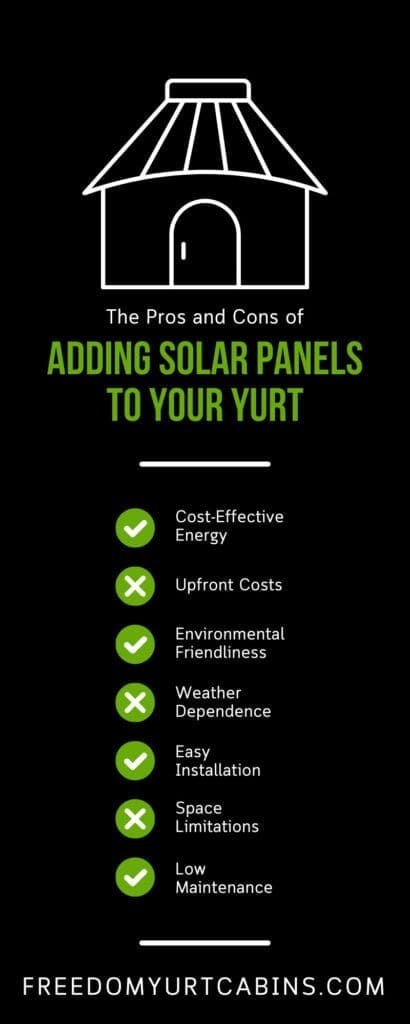Are you considering adding solar panels to your yurt? With the rise in popularity of off-grid living, many are turning to alternative energy sources like solar power. And with their compact size and eco-friendly benefits, solar panels seem like a perfect fit for yurts. But considering the advantages and disadvantages before you install them is important. Continue reading to explore the pros and cons of adding solar panels to your yurt.
The Pros
Let’s start with the positive aspects. Adding solar panels to your yurt comes with many advantages.
1. Cost-Effective Energy
The cost savings is one of the most appealing benefits of solar panels. Once installed, solar panels can significantly reduce your energy bills, allowing you to save money in the long run. This advantage is especially true for yurt owners living off-grid and relying solely on alternative energy sources.
2. Environmental Friendliness
Solar power is a renewable and clean energy source, meaning it does not produce harmful emissions like traditional energy sources do. You are reducing your carbon footprint and helping to protect the environment by adding solar panels to your yurt.
3. Easy Installation
Like yurt kits, solar panels are relatively easy to install, especially for smaller structures like yurts. The process typically involves mounting the panels on the roof and connecting them to an inverter that converts the energy to a usable form. With minimal installation time and effort, you can start reaping the benefits of solar power in no time.
4. Low Maintenance
Their low maintenance requirements are another advantage of solar panels. Unlike traditional energy sources that require regular upkeep, solar panels only need occasional cleaning to ensure maximum efficiency. This low maintenance means less hassle and more savings for yurt owners.
The Cons
While solar panels offer many benefits, you should also consider the drawbacks before adding them to your yurt. These include:
1. Upfront Costs
The initial cost of purchasing and installing solar panels can be a significant investment for yurt owners. However, it’s important to remember that this long-term investment will eventually pay for itself through cost savings on energy bills.
2. Weather Dependence
Solar power depends on the weather, which may not be as reliable as traditional energy sources. On cloudy or rainy days, the panels may not produce as much energy, which could lead to a power shortage for your yurt. You can mitigate this shortage by having a backup energy source ready.
3. Space Limitations
Yurts are known for their compact size, which may limit the space available for solar panel installation. Depending on your yurt’s size and location, you may need to get creative with panel placement or consider using smaller panels that may not produce as much energy.
Calculating Your Energy Needs
Knowing your energy requirements is the first step toward a successful solar panel installation. This step is essential because the size and number of solar panels you need directly correlates with the energy you consume. Here’s how you can calculate your energy needs:
Identify Your Appliances
Make a list of all electrical appliances in your yurt, including lights, kitchen appliances, electronics, heaters, air conditioners, and water heaters. Don’t forget to include smaller items such as phone chargers or computer devices.
Check the Wattage
Every electrical device has a power rating, usually stated in watts (W) or kilowatts (kW). You can find this information on the device label or in the user manual.
Calculate the Energy Use
Multiply the wattage of each device by the number of hours used per day. This calculation will give you the energy consumption in watt-hours (Wh) or kilowatt-hours (kWh).
Sum It Up
Add up all the energy needs of your appliances. This sum will give you a rough estimate of how much energy you need daily. For example, the energy consumption would be 500Wh or 0.5kWh if you keep a 100W light bulb on for five hours a day. You need solar panels that generate at least 0.5kWh per day if this is the only energy source you use.
Remember, these are just estimates. Real-world conditions such as weather, panel angle, and other factors can affect the actual output of your solar panels. Adding a buffer (around 20 percent more) to your calculations is always a good idea to account for these uncertainties.
Calculating your energy needs is a crucial step in adding solar panels to your yurt. By understanding your energy consumption, you can choose the right size and number of solar panels, ensuring you adequately power your yurt while maximizing the benefits of solar energy.
Common Misconceptions About Solar Panels
A few misconceptions often discourage yurt owners from investing in solar panels when it comes to alternate forms of energy. Let’s debunk some of these myths.
1. “Solar Panels Don’t Work in Cold, Cloudy Conditions”
Contrary to popular belief, solar panels operate efficiently in cold, overcast conditions. While it’s true that solar panels need sunlight to generate energy, they don’t need direct sunlight. They can still produce power even on cloudy days.
2. “Solar Panels Require Constant Cleaning”
Many believe solar panels require frequent cleaning to function effectively. However, rainfall is sufficient in most climates to keep your solar panels clean. Unless you live in a very dusty or bird-populated area, you will need to clean your panels.
3. “Solar Panels Will Damage My Yurt’s Roof”
Solar panels are lightweight and use a non-intrusive mounting system that doesn’t harm your yurt. They can even provide additional insulation and help protect the roof from weather and UV radiation.
4. “Solar Panels Take Too Long To Pay Off”
While it’s true that solar panels involve an upfront cost, they can save you money in the long run. Solar panels often pay for themselves via reduced energy bills within a few years. As energy prices rise, the payback period could become even shorter.
5. “Solar Panels are Hard To Install”
Solar panel installation may seem complex, but it can be a straightforward process with the right support and guidance. Many suppliers offer complete installation services, making it easy for you to switch to solar energy.
We hope you’ll feel more confident about taking the leap and adding solar panels to your yurt by dismissing these common misconceptions. Remember, going solar is a beneficial decision for your wallet and a step in the right direction for our environment.
Final Thoughts
While the pros and cons of adding solar panels to your yurt offer cost-effective, environmentally-friendly energy and require low maintenance, you should also consider the upfront costs and potential limitations. However, you may find that with proper planning and research, adding solar panels to your yurt can be beneficial in many ways and help you live more sustainably. Contact our team at Freedom Yurts Cabin with any questions you may have. We can help you determine if solar panels are the right choice for your yurt and budget.




No responses yet